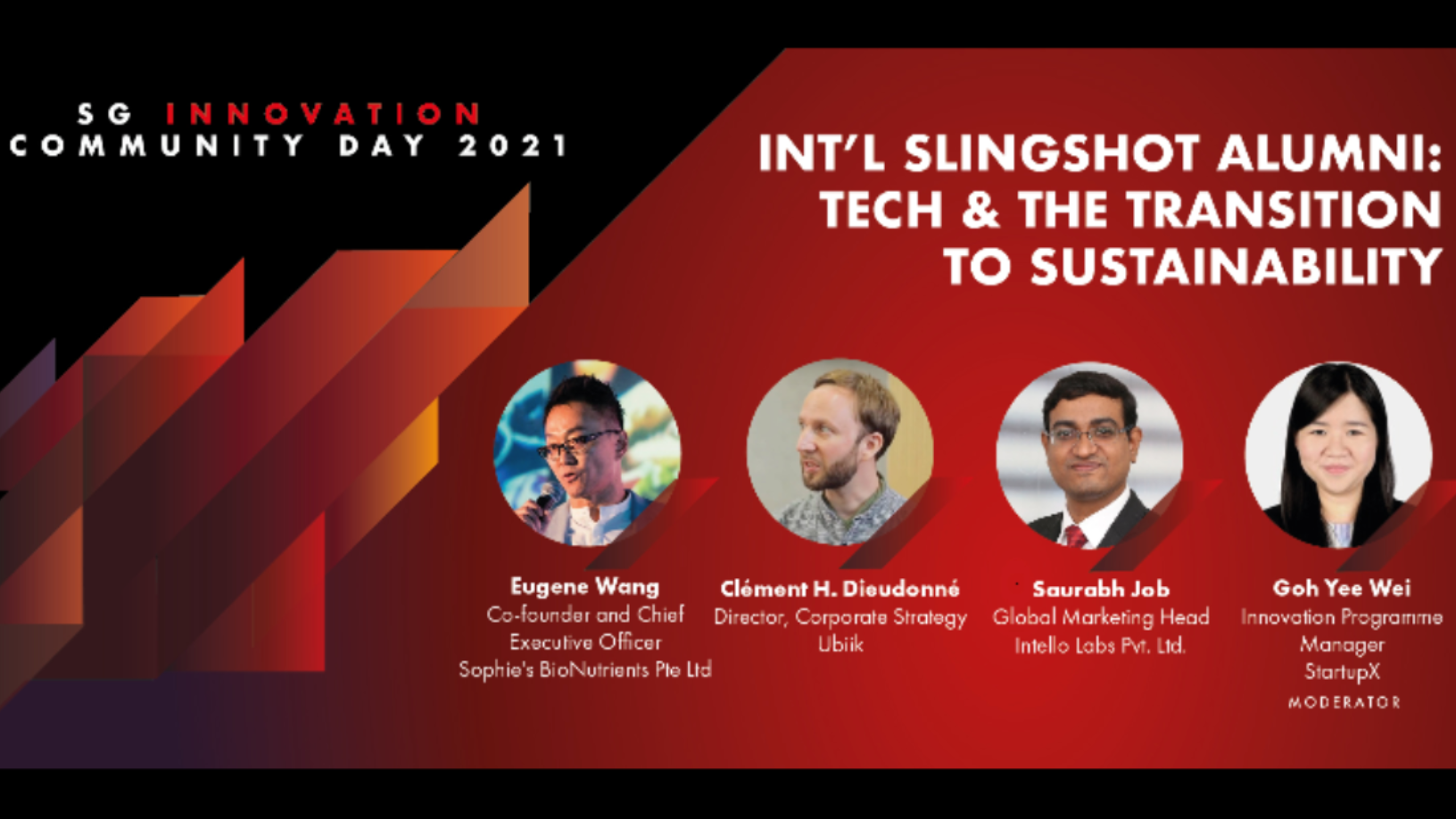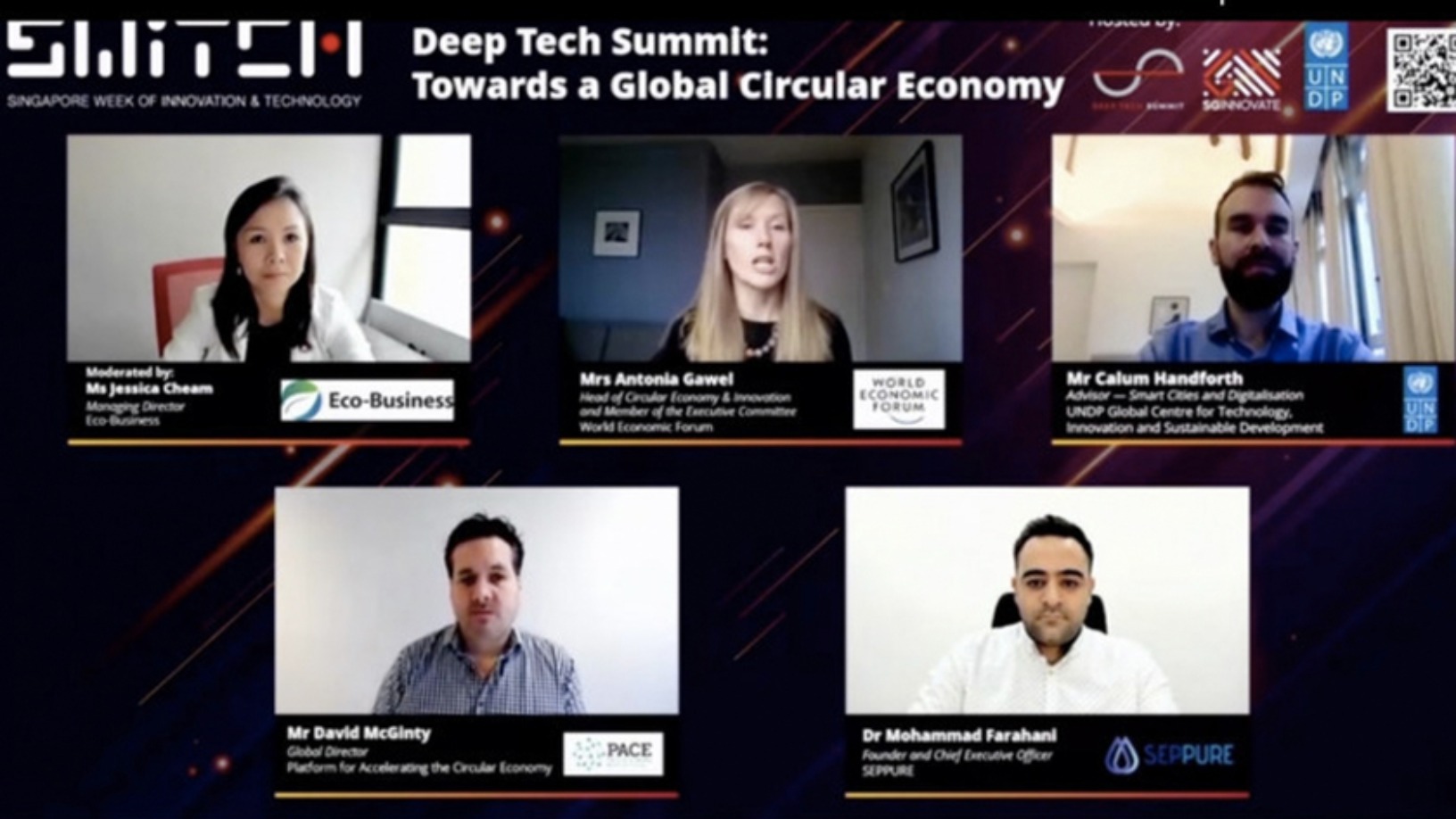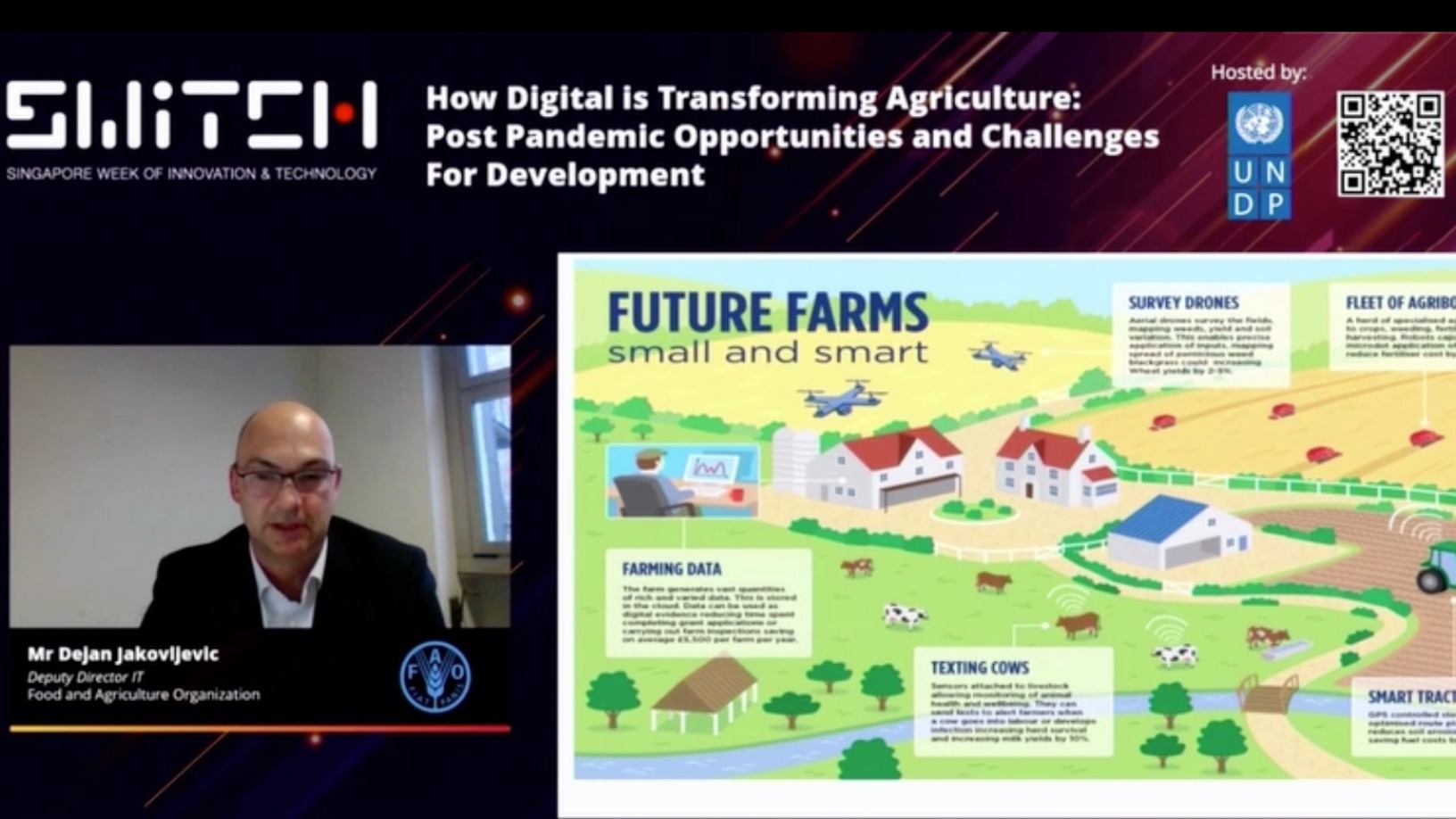More corporates are embracing sustainability, seeking solutions from startups like Sophie's BioNutrients, Ubiik and Intello Labs to help them shift to renewables and upcycling industrial waste, the companies said at the launch of the 2021 SWITCH Singapore online conference earlier this week.
All three startups competed in the previous SWITCH Slingshot pitch challenges in 2017, 2019 and 2020, respectively. In a panel titled Tech & the Transition to Sustainability on August 4, Eugene Wang, CEO and co-founder of Sophie's BioNutrients; Clément Dieudonné, Director of Corporate Strategy at Ubiik; and Saurabh Job, Head of Global Marketing at Intello Labs joined moderator Goh Yee Wei, Innovation Program Manager at StartupX, to discuss the latest sustainability trends and offer advice to aspiring startups entering the sector.
Singapore-based Sophie’s BioNutrients uses industrial waste to feed microalgae, which it converts into microalgae-based flour that can be used to make almost any alternative protein product. India-based Intello Labs’ AI-driven multispectral tools that monitor food quality and prevent food loss are being deployed in e-commerce and food delivery. At the intersection of IoT and energy, Taipei-based Ubiik helps corporates reach their sustainability goals by integrating renewables and lowering electricity consumption with smart metering solutions. It’s currently working with Taiwan Power to deploy 6m smart meters by 2030.
The following discussion has been edited for length and clarity.
Goh Yee Wei: Could you share with us some technology and supply chain trends?
Clément Dieudonné: There's been a huge new phase of hardware innovation. People usually zoom in on software. But with big data and AI analytics, you need a reliable set of hardware and network to enable and support the insights at scale. This has been kind of a revolution as hardware is not easily scalable as software in general.
In relation to the supply chain, it has been a terrible alignment of the stars from a semiconductor standpoint. The problem of chip shortage is global and pervasive, worse than we expected. It's touching our suppliers, customers and ourselves; it caught everybody by surprise. The problem has grown over the past few months and is unlikely to improve until next year.
The only takeaway we can get from this is thinking long-term. We had long-term engagements with our customers, so we could have some stock levels for the foreseeable future. But when it comes to new products, it’s much harder to be nimble.
Eugene Wang: It’s not just limited to the hardware industry. In the pre-pandemic era, everything was centralized, done with one big manufacturer or distributor. All of a sudden, more people are seeing a decentralized supply chain in different industries. A more agile system is possibly what we should develop. Not everyone was talking about costs or efficiency.
This pandemic was an alarm bell, telling us that we got a problem with designing, manufacturing, and supplying stuff. I’m seeing some investors are trying to make the shift. Going forward into the future, things may be a little bit more expensive, but that's okay because when the next pandemic or natural disaster hits, we will have a better supply system that can supply whatever you need.
Saurabh Job: As the pandemic brings its own sort of challenges like lockdowns, we see an increased recognition and growing adoption of automation in any area we work. People not only want the technology in a mobile format but also something which can help them in physical forms, such as machinery or hardware.
In areas like food quality assessments, we can do everything digitally in the current times when people are not physically around. Saurabh, do you observe an uptick in demand for software solutions?
Job: Because of the Covid-19 pandemic, there are labor shortages. And the challenge of social distancing is increasingly creating a need for our solutions, which can reduce the quality inspection time from minutes to seconds and be integrated into any system, which can help customers monitor remotely. There’s definitely an uptick here.
Eugene, could you share with us some of the trends in the alternative protein space?
Wang: This pandemic revealed two things: food safety and food security. When you're in lockdown, there's nothing else you can do other than eat, sleep and work. There’s not a lot you can do to work out, so people realize the way they eat is not healthy. Hence more consumers are considering alternative proteins, especially plant-based proteins, as they are lower in calories and help you feel more energetic. Consumers, investors and corporates are also embracing alternative proteins as they realize alternative proteins can help address food safety and security issues.
When it comes to slaughterhouses, animal farms and repackaging of meat, we're still unable to develop a fully automated machine or software system. Everything has to be done by labor. During this pandemic, that’s scary and problematic. That's how we got our fair share of attention in this pandemic. Many problems have been brought up during the crisis, presenting a lot of opportunities for entrepreneurs.
Many corporates have very ambitious goals in sustainability and are also working with startups. Do you see an uptick in corporate demand for sustainability solutions?
Job: We've been working with some of the leading players in the e-commerce and food delivery spaces. From a sustainability perspective, preventing food loss is one of the key challenges they face. If you can identify the defective items early, it prevents further loss along the supply chain. Also, thefaster and more detailed analysis makes everything more objective and transparent along the supply chain.
That’s where we see a need from some food categories, particularly perishable fruits and vegetables. To prevent decay, we've seen some of our clients deploy solutions to make the entire end-to-end process more transparent and easy to monitor. That has been a great advantage because it impacts not only their profit and loss but also on customers who are dependent on the supply chain for food.
Dieudonné: We’ve been in touch with many industries, for example, telecom operators and semiconductor manufacturers. They're being pushed by their own customers – chip designers or end users – toward corporate sustainability by using more renewables and saving resources. Companies ask us to help them make a roadmap and implement it to prove that they are more energy-efficient.
That trend is accelerating, especially this year. Along the whole supply chain, be it telecom operators or electronic equipment manufacturers, the way they manufacture or bring their products or services to consumers is becoming increasingly green.
Wang: At Sophie’s BioNutrients, we use industrial waste to feed our microalgae. We found that Nestlé’s Milo spent grains are great for use, and Nestlé is very keen to work with us. Corporates have realized that you really have to find any source of revenue stream or any way to make your system more efficient.
We also work with Fuji Chemical Industry from Japan, where people are still focusing very much on premium and delicate products. But Fuji Chemical has already thought about what to do with the sake waste from the sake breweries and the rice bran from rice processing. It turns out that all those are available or possible to be used to feed our microalgae. It's not just about consumers asking these corporates to be more sustainable. The corporates themselves want to be in the game and want to be competitive.
What is the one piece of advice that you would give to a startup venturing into the sustainability space?
Dieudonné: Innovation for us as a startup is a statistical process. We have to try many different use cases because the first one we focus on might not be the right one. We cannot control all of the parts of the equation. So it's about speed and agility to try many use cases. As soon as you find the one that really looks good, you focus on that.
It worked well for us when we worked on 100 pilots for different IoT applications. We found out that energy management and monitoring was a very good sweet spot and focused on that. That's a realistic way that made us successful. For sustainability, the trend is very good, but the key is to sample a few niches where you can offer a very differentiated solution.
Job: Sometimes, new startups are coming into this space to focus only on the near term. From our experience, we would suggest they look at the immediate needs that are there and look at the future. The emerging trends can be multiple and constantly changing. Focus on your product development and R&D, so when the time is right, and customers are ready, you have the right product in their hands.
Wang: In the past, when you talk about sustainability, many people just talk the talk. If you're an entrepreneur who wants to be in the sustainability business, just walk the talk. As long as you walk the talk, you will find the problems and find the solutions as well.










